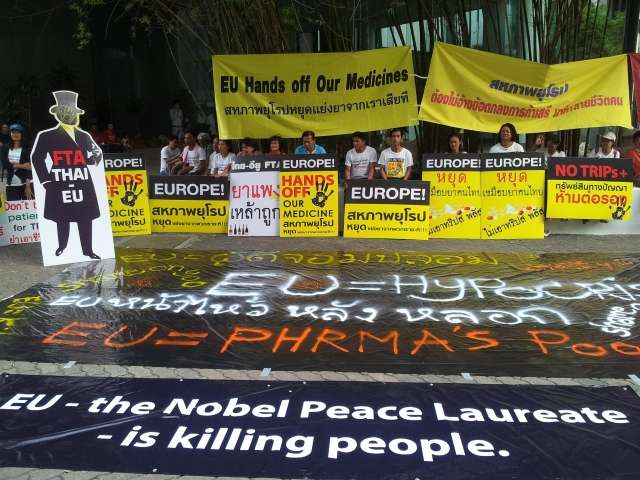April 9, 2013
Dear Mr. Martin Schulz and Mr. Jose Manuel Barroso,
It was with great disappointment that the global community working on the promotion of access to affordable medicines witnessed the official launch of the negotiations of a Free Trade Agreement (FTA) between the EU and Thailand, during the Thai Prime Minister’s visit in Brussels on March 4-8. Civil society organizations fear that intellectual property (IP) provision exceeding World trade organization (WTO) rules on IP (known as TRIPS-plus provision) and which are damageable to access to affordable essential medicines are included in the negotiating text.
Previous leaked FTA negotiating texts between the EU and South Korea, ASEAN, and India encompassed IP TRIPS-Plus provisions which lead us to think that the EU will try to include similar IP provisions in the Thailand FTA negotiations. Investment measures are another cause of concerns to us. We are particularly worried about investor-to-state dispute settlement mechanism inserted in FTA’s investment chapter which allow a foreign company to sue a state if it assesses that a national law or policy constrains its enjoyment of investment rights. This risks constraining national policy and legislation in the domain of public health for example.
These provisions threaten access to lifesaving medicines for patients in developing countries and undermine governments’ abilities to regulate in the public interest. Strict IP TRIPS-plus provisions undermine the generic medicines’ industry, which is key to create more competition in order to lower drug prices and secure people’s access to essential medicines. Moreover, IP and investment provision could circumvent the use of TRIPS flexibility by government to provide its population with medicines. Details of the TRIPS plus provisions in the EU’s FTAs and their adverse impact are as in the attached document.
EU pursuing TRIPS-plus obligations is incoherent with its own commitment to the Doha Declaration on the TRIPS Agreement and Public Health, that puts public health before IP rights and encourages WTO members to fully use TRIPS safeguard provisions to protect public health and enhance access to medicines for developing countries.
The European Parliament resolution on the TRIPS Agreement and access to medicines (12/07/2007) urges the EU to:
- Expressly endorse full implementation in developing countries of TRIPS flexibilities as recognized in the Doha Declaration to promote access to medicines for all (eg. The use of compulsory licenses)
- Keep its commitments to the Doha Declaration and to restrict the Commission’s mandate so as to prevent it from negotiating pharmaceutical-related TRIPS-plus provisions affecting public health and access to medicines, such as data exclusivity, patent extensions and limitation of grounds of compulsory licenses, within the framework of the EPA negotiations with the ACP countries and other future bilateral and regional agreements with developing countries.
Even though the European Parliament voted against ACTA on July 4th, 2012, we fear that provisions similar to ACTA’s border and IP enforcement measures, that would undermine the production and trade of generic medicines worldwide, have been integrated in the FTA the EU is currently negotiating with Thailand and India.
We urge the EU not to breach its commitments to improving public health in developing countries and to respect its own Parliament’s resolution protecting public health access over excessive IP rules. Patients in development countries should have access to essential medicines at affordable prices and their governments should have the political space necessary to use public health safeguard and pursue pro-public health policies. Recommendations on IP rules and public health made by international organizations such as UNDP, UNAIDS, WHO, UNITAID or the Global Fund to Fight AIDS, Tuberculosis, and Malaria should be taken into consideration by the EC while negotiating FTA.
We, the undersigned civil society organizations in Thailand, stand in solidarity with all other civil society agencies in Europe and Asia and urge the EC to bear in mind access to medicines considerations while negotiating FTA and to refrain from pressuring third-world countries to accept TRIPS-plus provisions, as well as a dangerous investment chapter that would reduce governments’ political space to take pro-public health policies.
We hope that our concerns will be heard and taken into consideration. We remain available to discuss further these issues if you wish so.
Yours faithfully,
Asst. Prof. Sumlee Jaidee
Chairperson
FTA Watch
The Thai Network of People living with HIV/AIDS (TNP+), Stopdrink Network, Alternative Agriculture Network (AAN), Assembly of the Poor, 4 regions of Slum Network, Renal Failure Patient Group, Cancer Patient Group, Thai NGO Coalition on AIDS, AIDS ACCESS Foundation, Foundation for AIDS Rights, Foundation for Consumers, Rural Pharmacists Foundation, Rural Pharmacy Association, Drug Study Group, BioThai Foundation, Ecological Alert and Recovery – Thailand (EARTH), Thai Holistic Health Foundation, Labor Alliance Group, Alcohol’s Danger Protection Campaign Network, The Network of Community Affected by Alcohol, The Network of the Alcohol’s Danger Surveillance in Bangkok, The Youth Network of the New Drinkers’ Protection, Harm Reduction Working Network (12D), Southeast Asia Tobacco Control Alliance (SEATCA), Focus on the Global South
Coordinator: Mr. Chalermsak Kittitrakul (jockey@aidsaccess.com)








